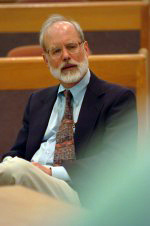It’s all but inevitable that when a court in the United States strikes down a law, supporters of the law will argue the judges have over-stepped their bounds and are acting as unelected legislators.
That’s led to a significant public debate in the United States about the role of the courts and their power of judicial review, the legal concept that lets courts invalidate laws on the grounds that it violates the Constitution.
But in many countries that are just now adopting judicial review, the legal concept has wide public support. How one of America’s most prominent legal exports has become so controversial at home will be discussed in a conference at the University of Iowa College of Law next month. “Judicial Review: Between Promise and Chagrin” is the topic of the annual meeting of the America Society of Comparative Law, to be held at the law school Oct. 4-6.

Nowhere is that more evident than Iowa, where three state Supreme Court justices were removed from the bench by popular vote in 2010 after a campaign mounted by groups opposed to the court’s unanimous 2009 ruling that legalized same-sex marriage. The Court had utilized its power of judicial review in that decision to overturn a state law that defined marriage as between a man and a woman, upsetting groups that were opposed to same-sex marriage.
“It’s a conflict we’ve had for years in the United States, between popular democracy and judicial review,” says John Reitz, a professor of law who is coordinating the conference with professors Adrien Wing and Alexander Somek. “Judicial review is good and it’s bad. Sometimes, the conflict becomes so tense that there’s a question of whether judicial review is undermining democracy, and recently in the United States, we’ve had very strong attempts to trim it back.”
The conference will be held in the midst of another campaign by those groups to unseat a fourth justice who voted in favor of that decision, Associate Justice David Wiggins, who is on the retention ballot this November.
Reitz says judicial review has traditionally been seen as a check against a country’s legislative and executive branches, giving the courts the power to reign in a government that passes law contrary to its constitution. In particular, it’s been celebrated as a way to protect the civil and human rights of minorities against unfair laws passed by elected bodies made up mostly of members of a majority group.
But courts that strike down laws using judicial review are criticized for acting as unelected super-legislatures that force laws on an unwilling public by unaccountable judges.
While judicial review has become increasingly controversial in the United States, it’s widely spreading around the world. Longstanding democracies like the United Kingdom, New Zealand and Canada have established courts in recent decades with the power of judicial review. But nowhere has judicial review been more strongly embraced than in parts of Eastern Europe and the former Soviet Union. In many of those countries, one of the first things they did after the fall of Communist governments was establish independent constitutional courts with wide powers of judicial review.
Reitz says scholars speculate that nascent democracies embrace judicial review so firmly because such courts have become such a powerful symbol of democracy. They suggest, also, that countries use these courts to ensure that one totalitarian dictatorship doesn’t get replaced by another. The court is asked to be a voice of the people.
On top of that, Reitz says the politics of a still-forming democracy are often so contentious that an independent arbiter is needed to hold things together.
But there, too, judicial review is controversial.
“There’s a thinking that democracy is a wonderful thing, but it can’t solve all of your problems, so you need a mechanism like judicial review also,” Reitz says. “The Russian constitutional court was immediately confronted by some of the most politicized cases you could imagine in the early 1990s, such as the constitutionality of the Communist Party.”
Now China has begun debating whether to embrace judicial review, but China has not generally adopted democratic elections. In this case, Reitz says judicial review seems designed, not so much as a part of democracy but as a replacement for democracy to legitimate state actions.
Reitz says the conference hopes to use comparative law to understand these kinds of paradoxes of judicial review.
More information about the conference is available online at www.law.uiowa.edu/news-events/ASCL.php.